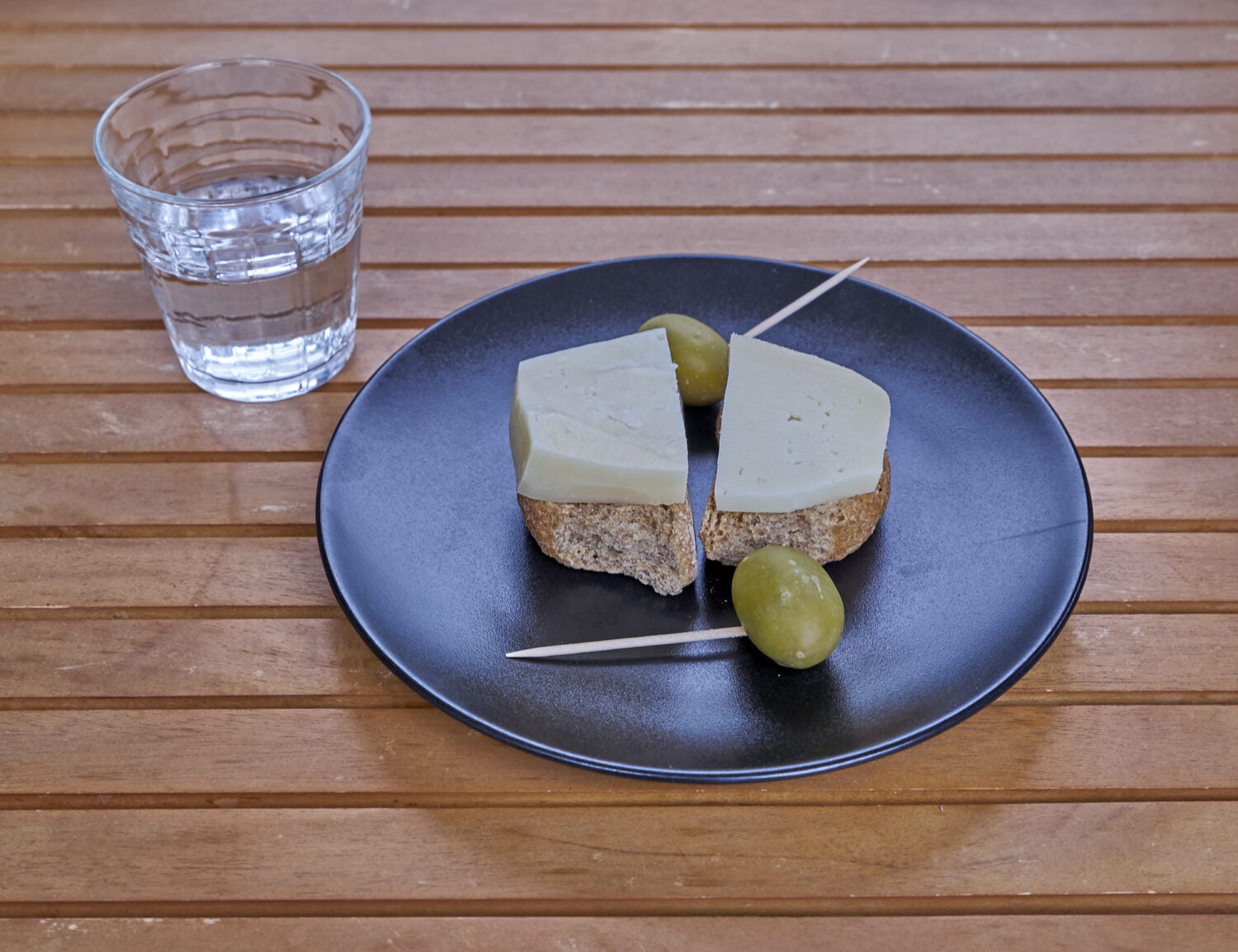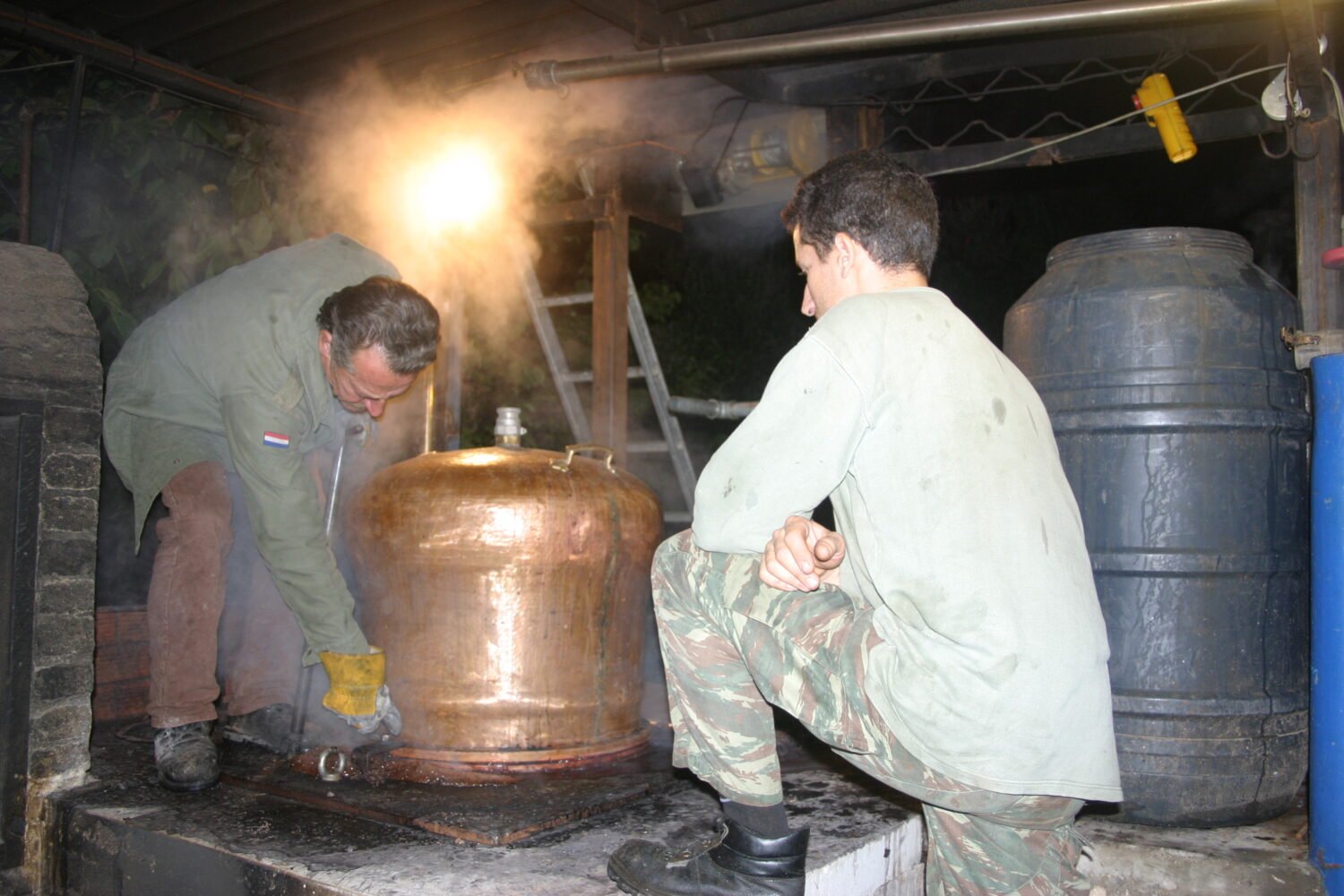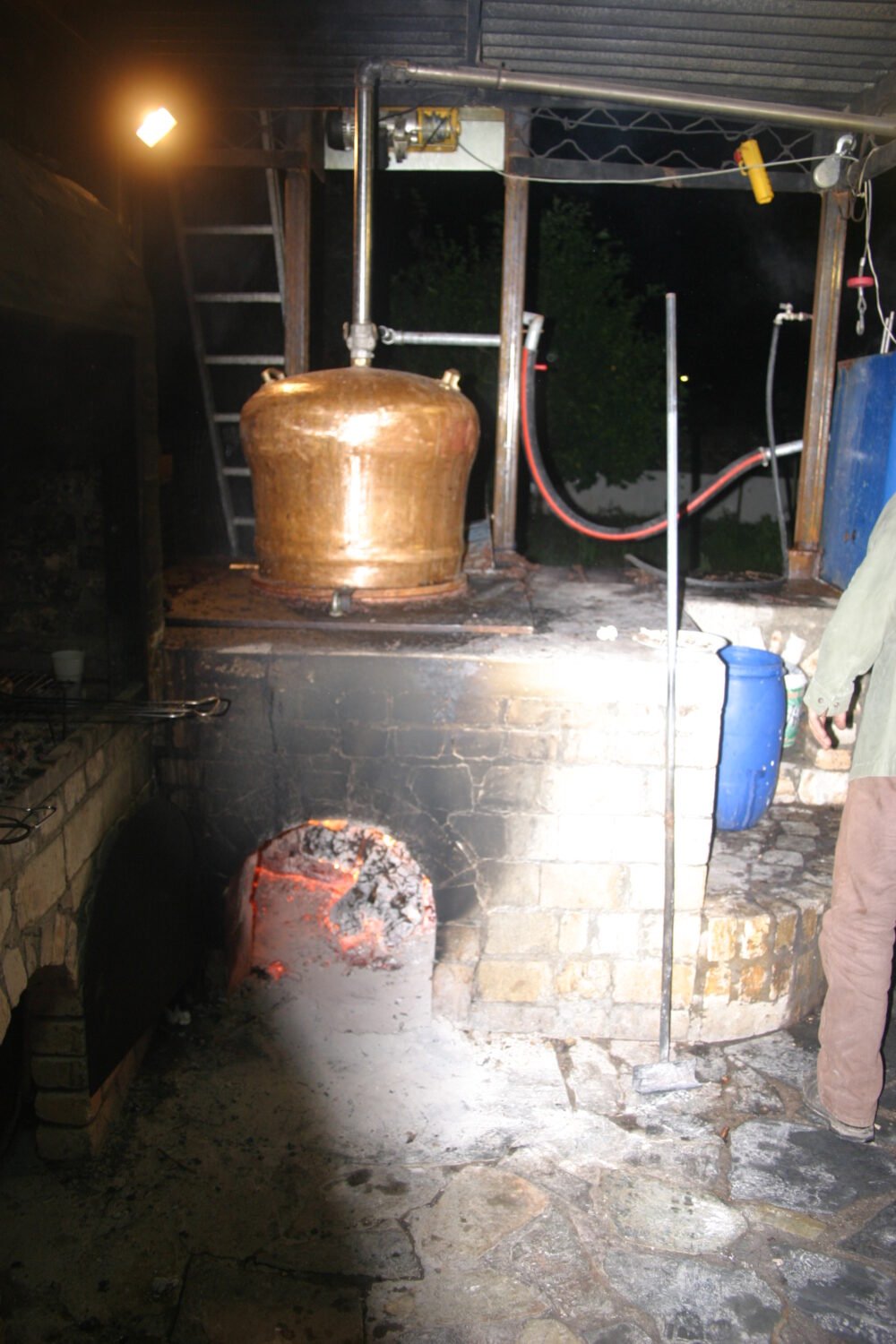Raki – All you ever need to know
People have been producing Raki for centuries in Crete, Greece. The production of Raki also known as Tsikoudia is an ancient practice and involves a unique distillation process that sets it apart from other spirits.

The first step in the distillation process is to create the mash. They mashed the grapes, grape leaves and debris into a thick paste. This paste is then placed in an alembic still and heated to a specific temperature. The distiller controls this temperature and is essential to ensure that the correct boiling point is reached.
They then leave the mash to heat in the still for a few hours. During this time, the alcohol evaporates and is collected in the condenser. This vapour is then collected and cooled to form the Raki.

The final step of the distillation process is to filter the Raki. This is done by passing the spirit through a filtering system to remove any sediment and impurities. After this, the Raki is ready to be bottled and enjoyed.
The unique distillation process used to make Raki gives it its unique taste and aroma. This spirit, which has been a favourite of Crete for centuries, is still enjoyed by many today.
Raki, the traditional Greek spirit, is a popular drink throughout the island of Crete, and many locals observe unique customs and practices when it comes to serving and enjoying it. Raki has been a staple of Cretan culture for centuries and has been an important part of many celebrations, from weddings to family gatherings.
In Crete, raki is traditionally served in small glasses with often a jug of cold water to dilute the drink. This is done to enhance the aroma and flavour of the raki. It is typically served before a meal, accompanied by meze such as olives, cheese, salted fish, and other small snacks. Locals often use raki to toast each other before a meal, with the oldest person in the group making the toast.
When it comes to drinking raki, there are several traditional customs that are observed in Crete. It is important to take small sips, as it is a strong drink and should not be consumed too quickly. As the drink is enjoyed, conversations usually turn to topics of local interest, such as the weather or the latest gossip.

Raki is thought to be a good digestive aid, so it is often served after a meal as a digestive aid. It is served in small glasses, and it is customary for the oldest person in the group to make a toast before the first sip is taken. After the toast, the glasses are passed around until the raki is gone.
Raki can also be used as a medicinal drink. The locals believe it can help with various ailments, including headaches, stomachaches, and colds. It is usually served warm with honey or lemon juice or sometimes with a few drops of olive oil.
Raki is a popular drink among the locals of Crete and is an important part of their culture. It is a strong spirit, yet it is enjoyed for its flavour, aroma, and its ability to bring people together. As locals gather to share stories and laughter over a glass of raki, it is a reminder of the beauty of Crete and its rich cultural heritage.
Raki has a long and storied history in Crete, and it has become a symbol of the island’s culture and traditions. The production and consumption of raki is closely associated with the island’s rich agricultural and winemaking traditions. Grapes are grown on the island and used to make raki. The production and consumption of raki has been a part of Crete’s cultural and social life for centuries and is deeply embedded in the island’s identity.
In addition to being a symbol of Crete’s culture, raki also has a religious significance. It is believed to be the drink of the gods and is often used in religious ceremonies. Raki is also seen as a symbol of hospitality and is often served to guests as a sign of welcome and respect.
Raki, also known as Tsikoudia, is a traditional Cretan spirit often enjoyed at the end of a meal or social gatherings. It is a strong, clear, distilled spirit, similar to Italian grappa or Russian vodka, and is made from the residue of the wine press, including the skins, seeds, and stems of the grapes.
The primary flavour of Raki is often described as clean and similar to anise. However, unlike other Mediterranean spirits such as Ouzo or Sambuca, it contains no anise or herbs. The taste can be potent and fiery, given its high alcohol content, ranging from 40% to 65%.
However, the flavour of Raki can vary depending on the type of grapes used, the distillation process, and whether it has been flavoured or aged. Here are some variations:
- Unflavoured Raki: This is the most traditional form of Raki. It has a strong, robust flavour that can be potent, especially for those unaccustomed to powerful spirits.
- Honey Raki (Rakomelo): This is a sweeter version of Raki, where honey and sometimes spices like cinnamon are added. The honey mellows out the strong alcohol taste, making it smoother and more palatable.
- Aged Raki: Some Raki is aged in wooden barrels, which can impart additional flavours to the spirit. The ageing process can make the Raki smoother and give it a slightly woody or nutty flavour.
- Fruit-Flavoured Raki: Some versions of Raki are infused with fruits, such as cherries or prunes, giving the spirit a fruity flavour and aroma.
- Herb-Flavoured Raki: In some cases, Raki may be infused with fennel, mint, or rosemary, adding a unique twist to its flavour profile.
Regardless of the flavour, Raki is typically served in small shot glasses and is often accompanied by a variety of meze or small dishes. It’s a spirit that embodies the hospitality and warmth of Crete and is an integral part of the island’s culinary culture.
Raki Is A Health Drink
First and foremost, Raki is known for its calming and restorative properties. It is often used to help with insomnia, anxiety, and stress, as it has a calming effect on the body and mind. In addition, it can help to improve digestion, as it helps to reduce inflammation and stimulate the production of digestive enzymes. This can be especially beneficial for those suffering from digestive issues, such as Crohn’s disease and irritable bowel syndrome.
Raki also has numerous anti-inflammatory properties, which can help to reduce pain and swelling in the body. This can be especially helpful for those suffering from arthritis or other inflammatory conditions. Furthermore, Raki can help to boost the immune system and reduce the risk of infection. It contains a number of antioxidants, which can help to protect the body from free radical damage and reduce the risk of certain types of cancer.

When it comes to weight loss, Raki can be a great tool for helping to suppress appetite. It can help to reduce cravings for unhealthy foods and increase satiety. This can be beneficial for those trying to lose weight, as it can help to reduce the amount of calories consumed.
Finally, Raki is a great source of vitamins and minerals, including potassium, calcium, magnesium, and iron. These vitamins and minerals can help to keep the body healthy and functioning at its best. It can also help to improve the health of the skin, hair, and nails, as well as boosting energy levels.
Raki is an ancient remedy that has been used for centuries to maintain health and well-being. Its health benefits are becoming increasingly recognised, with research showing it to be an effective remedy for a variety of health issues. It can help to reduce stress and anxiety, improve digestion, reduce inflammation, and boost the immune system. In addition, it can be a great tool for weight loss, as it can help to suppress appetite and reduce cravings. Finally, it is a great source of essential vitamins and minerals, which can help to keep the body healthy and functioning at its best.
Raki Grows In Popularity
Raki’s popularity has grown in recent years, and it has gained international recognition in the spirits industry. It has become a sought-after spirit in Europe, North America, Australia, and beyond. Its reputation has been bolstered by several awards, including a gold medal at the 2017 International Wine and Spirits Competition in London.
In addition to its increasing popularity, Raki has also gained recognition as a symbol of Cretan culture. Its unique flavour is seen as a reflection of the region’s rich history and vibrant culture. The spirit is often served with food, as part of a traditional mezze platter, or simply enjoyed on its own.
Raki is becoming an increasingly important part of the global spirits industry. In many countries, it is served in bars and restaurants and is becoming an increasingly popular choice for cocktails and other drinks. Thanks to its unique flavour and aroma, it is seen as a spirit that stands out from the crowd and is seen as a symbol of Greek culture.
In recent years, the global appreciation of Raki has grown, and it has started to gain recognition as an important part of the international spirits industry. Its unique flavour and aroma have made it a popular choice among many, and its distinctive character has made it a symbol of the Cretan culture. As its popularity continues to grow, so too will its global recognition.
Table of Contents
Views: 3105

